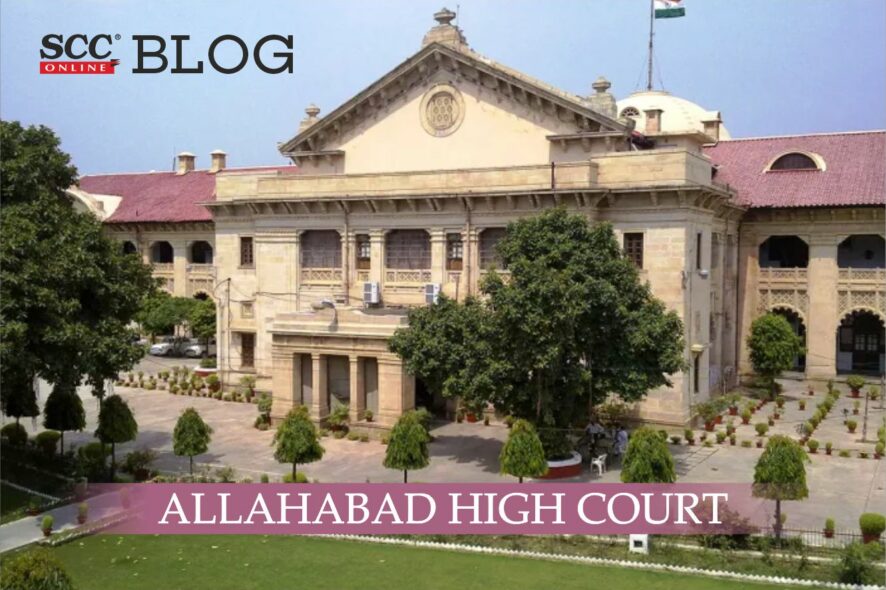Allahabad High Court: In an anticipatory bail application, Rajesh Chauhan, J. has directed the police to release the applicant on transit bail on executing personal bond of Rs. 50,000/- with two sureties of the like amount. The Court has also observed that there is no fetter on the part of the High Court in granting a transit anticipatory bail to enable the applicants to approach the Courts including High Courts where the offence is alleged to have been committed and the case is registered. The Court observed that there is no legislation or law which defines ‘transit or anticipatory bail’ in definitive or specific terms. Further, the 41st Law Commission Report recommended the provision of anticipatory bail to safeguard the right to life and personal liberty of a person under Article 21 of the Constitution of India; and on such recommendation the provision of anticipatory bail was inserted under Section 438 of the Code of Criminal Procedure Code (CrPC), 1973. It was also observed that the term “transit” means the act of being moved from one place to another while the word “anticipatory bail” means a temporary release of any accused person who is anticipating arrest; therefore, transit anticipatory bail refers to bail granted to any person who is apprehending arrest by police of a State other than the State he is presently located in.
The Court reiterated that Section 438 CrPC specifies direction for grant of bail to a person apprehending arrest and it confers power only upon the High Court and the Court of Sessions to grant anticipatory or transit bail if they deem fit. However, “transit anticipatory bail” is different from “ordinary bail”, as ordinary bail is granted after arrest, releasing the accused from custody while anticipatory bail is granted in the anticipation of arrest i.e., it precedes detention of the accused and is effective immediately at the time of the arrest. Thus, when an accused is arrested in accordance with the order of the court and whereas the accused needs to be tried in some other competent court having jurisdiction in the matter, the accused is given bail for the transitory period i.e., the time period required for the accused to reach that competent court from the place he is arrested in.
The Court viewed that transit bail is protection from arrest for a certain definite period as granted by the Court granting such transit bail, and the mere fact that an accused has been granted transit bail, does not mean that the regular court, under whose jurisdiction the case would fall, would extend such transit bail and would convert such transit bail into anticipatory bail, and upon the grant of transit bail, the accused, who has been granted such transit bail, must apply for anticipatory bail before the regular court. Further, the regular court would consider such anticipatory bail, on its own merits and shall decide such anticipatory bail application. Therefore, it could be easily said that transit bail is temporary.
The Court took note of the decisions in Teesta Atul Setalvad v. State of Maharashtra, 2014 SCC OnLine Bom 4819 and Nikita Jacob v. State of Maharashtra (Anticipatory Bail Application No. 441 of 2021 decided on 17.02.2021) wherein it was held that the “High Court of one State can grant transit bail in respect of a case registered within the jurisdiction of another High Court in exercise of power under Section 438 CrPC“, The Court observed that there is no fetter on the part of the High Court in granting a transit anticipatory bail to enable the applicants to approach the Courts including High Courts where the offence is alleged to have been committed and the case is registered. Further, there is no doubt that the right to liberty is enshrined in Part-III of the Constitution of India and such rights cannot be impinged except by following procedure established by law. Thus, in the present case the applicants should get the privilege of transit pre-arrest bail in the light of the order passed in the case of Nikita Jacob (supra). Further, this protection was granted for a period of six weeks from the date of the order to enable the applicant to approach the competent Court seeking appropriate relief.
[Ajay Agarwal v. State of UP, 2022 SCC OnLine All 689, decided on 30.9.2022]
Advocates who appeared in this case:
Prashant Shukla, Advocate, Counsel for the Applicant;
Government Advocate, Counsel for the Opposite Party.







